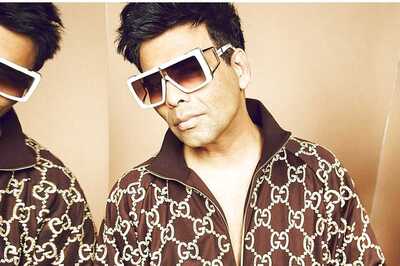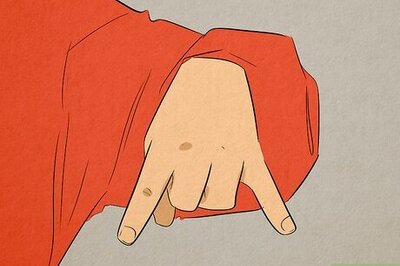
views
New Delhi: A total of 1.6 crore Sri Lankans will vote to decide their next president on Saturday. Amid the island nation's growing closeness to China, policy observers in India will be watching the election very closely.
While there are several contenders for the top job in Colombo, observers believe the race essentially boils down to two major frontrunners — Sajith Premadasa of the United National Party (UNP) and Gotabaya Rajapaksa of the Sri Lanka Podujana Peramuna Party (SLPP).
Both leaders belong to powerful political dynasties. Premadasa is the son of assassinated former president Ranasinghe Premadasa, while Rajapaksa's brother is former president Mahinda Rajapaksa, who led Sri Lanka's final assault in the civil war against Tamil separatists in the north.
In their own way, they have each expressed the desire to develop closer relations with India. Col. (Retd.) R Hariharan, who served as the head of intelligence for the Indian Peacekeeping Force in Sri Lanka from 1987-90, said India doesn't have anything to "worry" about with either of the two candidates.
Rajapaksa was the Defence Secretary of Sri Lanka during the civil war when his brother was President. Much of the accusations of human rights violations also fell on his shoulders. Despite that, he has managed to not to alienate India completely.
"Gotabaya has had first-hand experience of the advantage of having good relations with India during the Eelam War. In spite of strong anti-Sri Lanka political sentiment in Tamil Nadu, New Delhi did not allow it to overtake its national priority of not negatively intervening in Sri Lanka. India also helped out by softening the UN Human Rights Council when Rajapaksa was hauled up on allegations of gross human rights violations," he said.
National Security has been a key plank of the Rajapaksa campaign. Gotabaya, in his manifesto, has said he wants closer ties with India on matters of security cooperation. However, India does have concerns of a Rajapaksa presidency pushing Sri Lanka closer to China. After all, China is said to have financed Mahinda Rajapaksa's last campaign. With China invested in Sri Lanka's electrons, India does have reason to worry.
India may find Premadasa to be more amenable to a better relationship with India. The Tamil National Alliance (TNA), the primary Tamil party in Sri Lanka, has already endorsed Premadasa. This will also make him more palatable to Indian Dravidian parties than the hardliner Rajapaksa.
"During PM Narendra Modi's last visit to Sri Lanka, Sajith as housing minister accompanied PM Modi when he handed over houses completed under the India-aided project. At the time, their body language showed warmth on both sides," Col. Hariharan said. He, however, added, "Sajith is a four-time parliamentarian probably familiar with the good, bad and uglier history of India-Sri Lanka relations. He is expected to maintain good relations with India as his priority is development."
Between the two, however, Gotabaya is said to have the edge in this election. While Premadasa has led a development-centric campaign, Gotabaya has focused heavily on national security. The narrative in the island nation shifted after the Easter attack in April this year. Massive anti-Muslim riots were reported from north-western Sri Lanka which pushed the centre of the election campaign to the right and gave Gotabaya the advantage.
Add the new vitriolic discourse to Gotabaya's history during the civil war and you have a minority population fearful of another Rajapaksa presidency. "His name is linked to white van disappearances and gross misuse of armed forces and military intelligence in carrying out kidnappings and killings. He had been resisting both local and international inquiries into allegations of war crimes," Col. Hariharan said.
India's Dravidian parties have time and again expressed their distrust of the Rajapaksa brothers. That, along with China's influence on the Rajapaksa campaign, has New Delhi worried.
After Sri Lanka had to lease the Hambantota port for 99 years for failing to repay a Chinese loan, India has pointed out how the Chinese investment is essentially "debt trap diplomacy".
India, on the other hand, has funded a housing project which involves the construction of 1,200 houses in war torn northern Sri Lanka. India also funded the Jaffna Cultural Centre, a commitment of the Indian state towards the Tamil cause. "India's development outreach," said a senior government source, "is need based. We ask partner countries what they need. Unlike China, we don't impose projects on our neighbours."
And yet, Beijing's vice-like grip on Sri Lankan politics persists. Col. Hariharan believes it has been decades in the making. "China has been whittling down India's geo-strategic advantage in Sri Lanka and Indian Ocean Region (IOR) during the last two decades. China's influence made a quantum jump during President Mahinda Rajapaksa's decade long rule that ended in 2014. Since then, China has tightened its stranglehold on Sri Lanka's economy and limited strategic autonomy," he said.
However, India now has a historic opportunity to balance this relationship once again. The Srisena-Wickramasinghe government has tried to change the balance of power and India has once again found a foothold in its southern backyard.
In fact, said Col. Hariharan, China and Sri Lanka may find it difficult to operate in the region without a partnership with India. "The incoming president has little option but to keep up the good relations with China particularly as the Colombo Port City project is completed and opens for business. But as I had been saying it offers a chance for both Sri Lanka and China to build better relations with India because India's participation is essential in the port city financial hub."


















Comments
0 comment